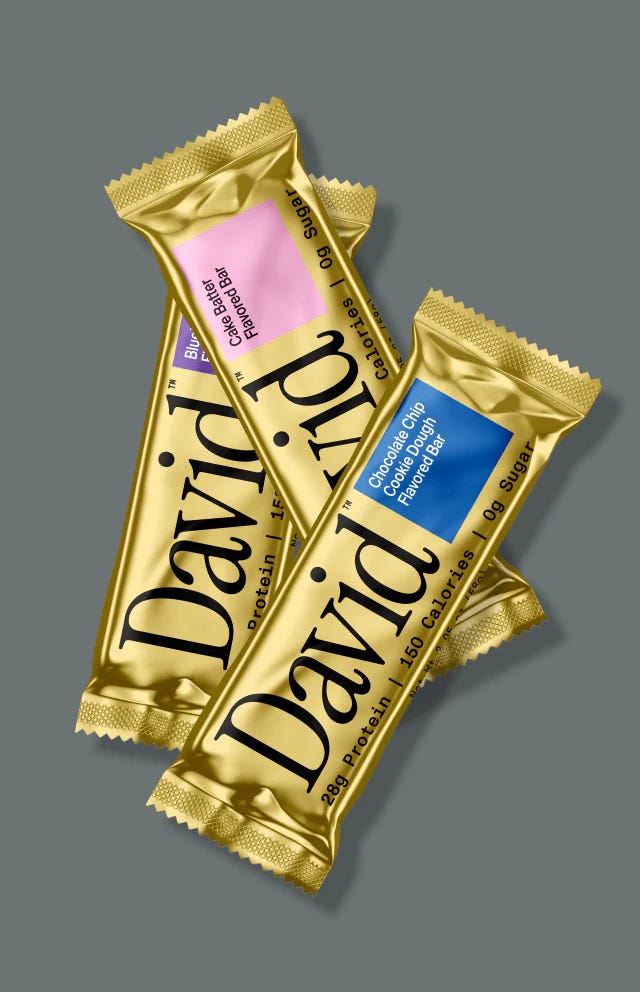The future of healthy snacks
A new lawsuit raises questions about innovation, supply chain control, and the future of better-for-you snacks

I didn’t expect a protein bar to send me down a rabbit hole about a lawsuit over one ingredient and the future of healthy snacks. And yet, here we are.
In the quiet corridors of the packaged food industry, a high-stakes battle is unfolding. Not over branding or distribution, but over the molecular building blocks of modern “health food.”
Which brings us to David. Not a person, but a protein bar company. (The company is actually named after Michelangelo’s statue of David.) And not just any protein bar company, but one that’s currently being sued over a secretive acquisition, and yes, it’s as dramatic as it sounds. But before we get into the legal saga, let me back up for a second, because the bars themselves? Worth pausing for.
They’re only 150 calories and somehow pack in 28 grams of protein. I know. It’s kind of wild. (If you’re not deep in the protein bar world, that’s an unusually high protein-to-calorie ratio. Most bars either have more calories or way less protein.) A 12-pack is $39 on Amazon. I spotted them being sold individually at a cafe in New York City, and naturally, I had to try one. I ended up eating two in one sitting. They were good. Not “dessert” good, but definitely “wait, this has 28 grams of protein?” good. They reminded me a bit of IQ bars, but with little crisps that made the texture more interesting and less dense.
One of the founders is Peter Rahal, who also co-founded RXBAR, the OG minimalist protein bar that leaned into paleo ingredients and clean-label simplicity. David feels like the next evolution of that ethos, but flipped on its head. It’s not trying to be a clean-label, whole-food bar like RXBAR. It’s unapologetically formulated, purpose-built for macros, not farmers’ markets.
Also in the mix is David’s other co-founder, Zach Ranen. Before David, he launched RAIZE, an online bakery known for its soft, fresh, gluten-free cookies that somehow had no added sugar, no preservatives, and just one carb per cookie. According to RAIZE’s website, the company shut down operations in August 2023. Ranen seems to know how to scale niche, better-for-you products with cult potential, which makes his role at David all the more interesting.
And then there’s Dr. Peter Attia, a well-known physician in the world of longevity. He’s listed as David’s Chief Science Officer. I first heard about the bars on the Huberman Lab podcast (of course). David raised $10 million in their seed round in August 2024, and just recently closed a $75 million Series A at the end of May 2025.
Which brings us to the plot twist.
Turns out, David is now at the center of a lawsuit. And it’s not just about bars. It’s about power, an ingredient, and who gets to stay in the game.
A group of three small food companies (OWN Your Hunger, Lighten Up Foods and Defiant Foods) is suing David, claiming the brand cut them off from a key ingredient used to make lower-fat, lower-calorie products. That ingredient, called EPG, is a patented fat replacer that mimics the taste and texture of real fat while cutting calories from fat by 92%.
These companies say their products were built around EPG, the ingredient that made their snacks work. David quietly bought the only company that makes it, Epogee LLC, and according to the lawsuit, locked up a two-year supply, effectively cutting off access to competitors. Just... took it off the table. The acquisition was made public on May 27. Since then, some competitors have laid off staff, discontinued products, or, in some cases, shut down operations entirely.
The lawsuit is still playing out, and David hasn’t said anything publicly. But at this point, it’s not just about bars. It’s about what happens when one brand controls the one thing their competitors need to stay in business.
You don’t need to work in the food industry to see what’s at stake. Three small brands took a chance on this fat replacer that made healthy snacks taste like the real thing. Then the only supplier got scooped up by a competitor. Access? Gone. It was strategic, sure, but for everyone else, it was a total gut punch.
Now they’re at a crossroads: either go back to the drawing board and reformulate without the ingredient their products were built around, or explore whether it’s even possible to create their own proprietary EPG. Neither path is easy.
Doesn’t it feel kind of crumby to edge out your competitors by cutting off their access to the one ingredient you both rely on? Like, it’s not that your product’s winning because it’s necessarily better—it’s winning because no one else is allowed to show up. It feels a little… off, right?
This isn’t just about a few startups getting pushed aside. When one company controls the thing everyone else needs to compete, the whole game shifts. A brand could have a brilliant idea, or even a better-tasting bar, but if they can’t get the same ingredients, they’re out before they even begin. And that doesn’t just affect founders or investors—it affects us too. It shapes what we see on shelves, what options we have, and what we actually get to eat. If we care about real choice and fresh ideas, this isn’t just a legal fight. It’s a food fight.
What happens when a brand wins by locking others out instead of by being the best? Is that still a win worth cheering for?
Would love to know your thoughts in the comments! Thanks for reading!
Take care,
Rebecca


